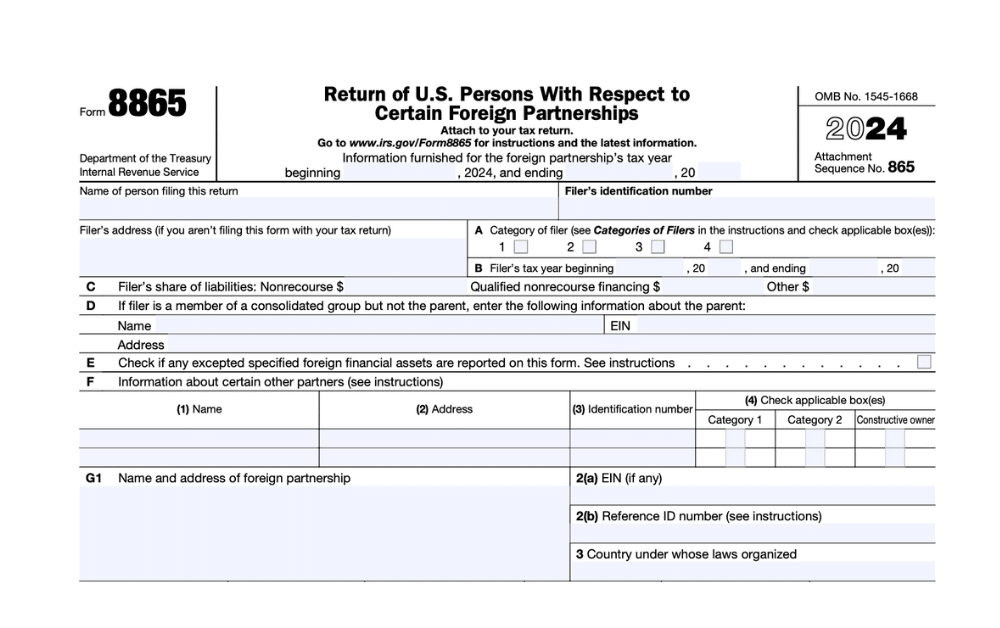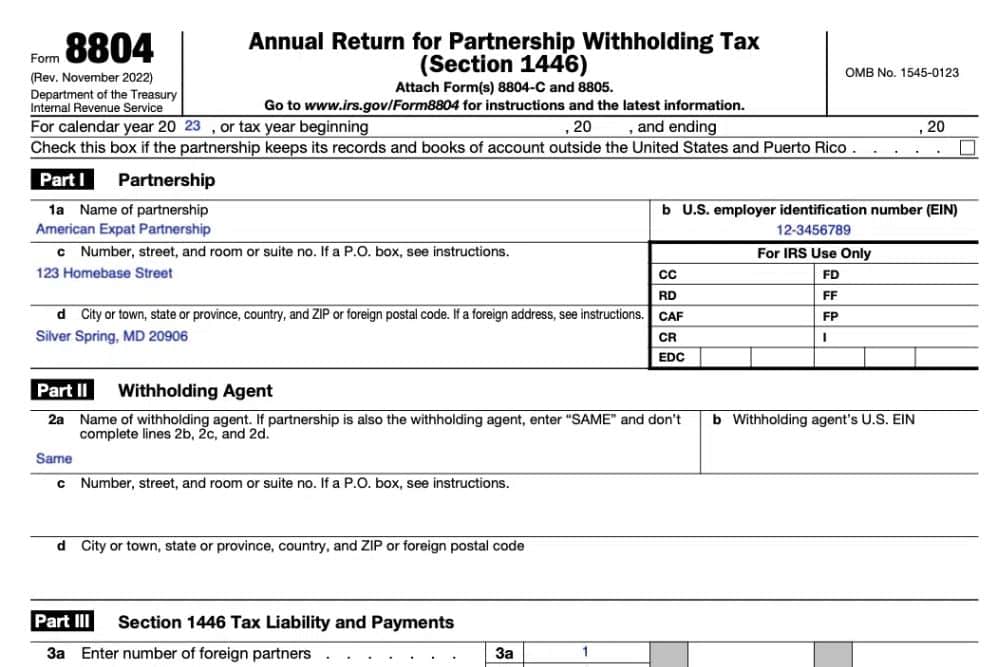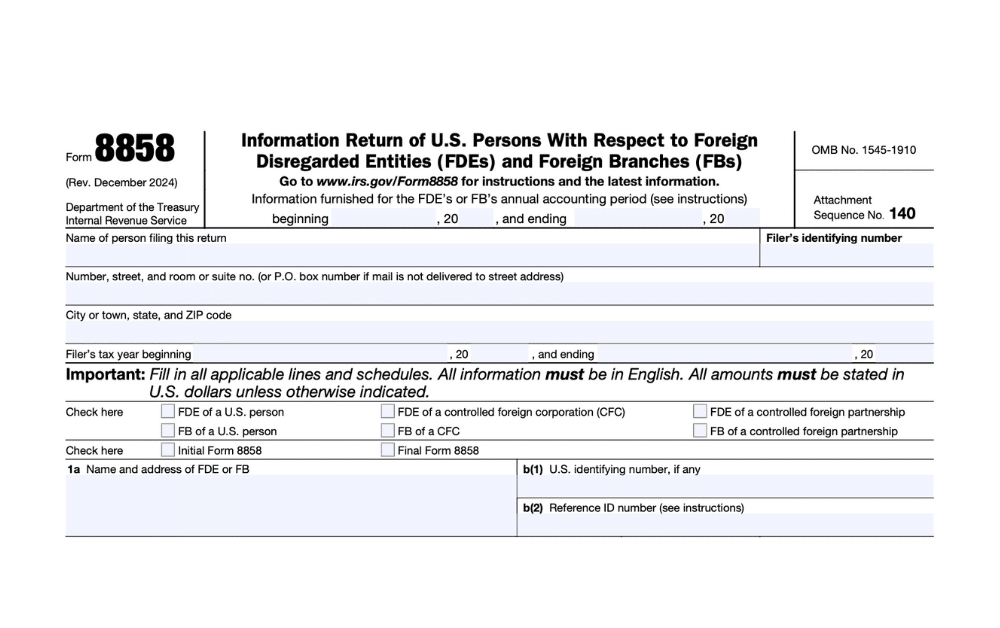What Are the US Tax Requirements for Foreign Partnerships?

When it comes to US tax requirements for foreign partnerships, US expatriates should be aware of several key aspects. Firstly, the United States taxes its citizens and resident aliens on their worldwide income, including income from foreign partnerships. This means that if an American expat is a partner in a foreign business, their share of the partnership’s income must be reported to the IRS, regardless of where the money is earned or if it is repatriated to the US.
Additionally, US expats involved in foreign partnerships may need to file specific forms, such as Form 8865 (Return of US Persons With Respect to Certain Foreign Partnerships), which requires detailed financial information about the partnership. This form is critical in cases where the US expat has a controlling interest or makes significant contributions to the partnership. Failure to comply with these reporting requirements can lead to substantial penalties. Furthermore, the United States has tax treaties with numerous countries that could affect how foreign partnership income is taxed.
This article describes the US tax requirements applicable to foreign partnerships.
Key Takeaways
- A foreign partnership that has ‘effectively connected income’ or ‘US source income’ generally must file Form 1065.
- A US person that has any income from a partnership, whether reported on a form K-1 or not, and whether from a US for foreign partnership.
- Certain US partners in foreign partnerships must file Form 8865.
What Is A Foreign Partnership?
For US tax purposes, the Internal Revenue Code generally defines a ‘partnership’ as a syndicate, group, pool, joint venture, or other unincorporated organization through or by means of which any business, financial operation, or venture is carried on and which is not a corporation or a trust or estate. In easier terms, a partnership is generally when two or more people go into business together, not as a corporation.
In addition, the Internal Revenue Code generally defines ‘foreign’ as a partnership that is not created or organized in the United States or under the law of the United States or of any state in the United States for purposes of a partnership.
When you live in the US, tax day is simple: April 15th! When you move abroad, it’s not so straightforward! Learn about all the expat deadlines and extensions you need to know to file.

How Does A Foreign Partnership Report?
The US tax reporting obligations of a foreign partnership will be determined based on whether the partnership is subject to a general rule or two exceptions to this general rule.
General Rule
A foreign partnership, for US tax purposes, must file Form 1065, ‘US Return of Partnership Income,’ if either:
- The foreign partnership has gross income effectively connected with the conduct of a trade or business within the United States (“effectively connected income”); or
- The foreign partnership has gross income derived from sources in the United States (“US source income”).
- A foreign partnership with effectively connected income or US source income must file Form 1065, even if its principal place of business is outside the United States or all of its partners are foreign persons.
In easier-to-understand terms, any partnership that earns income from the US must file a partnership return on Form 1065, even if all partners are foreign persons.
First Exception To General Rule – Foreign Partnerships With US Partners
A foreign partnership is not required to file Form 1065 if:
- The foreign partnership had no effectively connected income during its tax year;
- The foreign partnership had a US source income of $20,000 or less during its tax year;
- Less than one percent of any partnership item of income, gain, loss, deduction, or credit was allocable in the aggregate to direct US partners at any time during its tax year; and
- The foreign partnership is not a withholding foreign partnership (a partnership that has entered into a withholding agreement with the Internal Revenue Service).
Second Exception To General Rule – Foreign Partnerships With No US Partners
A foreign partnership also is not required to file Form 1065 if:
- The foreign partnership had no effectively connected income during its tax year;
- The foreign partnership had no US partners at any time during its tax year;
- All required Forms 1042 (relating to the reporting of tax withheld on certain income of foreign persons, including foreign partnerships and certain payments) and Forms 1042-S (relating to the reporting of certain income, amounts withheld, payments, and distributions) were filed by the foreign partnership or another withholding agent;
- The tax liability of each partner for amounts reportable under Income Tax Regulations Section 1.1461-1(b) and (c) (relating to income tax returns and information returns) has been fully satisfied by the withholding of tax at the source; and
- The foreign partnership is not a withholding foreign partnership.

Principles of US Partnership Taxation
In understanding the US taxation of foreign partnerships, it is important to note the following two basic principles:
- Form 1065 is an information return used to report the income, gains, losses, deductions, credits, and other information from the operation of a partnership. The partnership does not pay tax on its income, and
- Instead, the partnership passes any income directly to its partners, who are required to pay taxes. The partnership reports income and other tax items to its partners using Schedule K-1 of Form 1065.
Tax Obligations of US Partners
A US person who is a partner in a foreign partnership is subject to the general rule that a US citizen is taxed on worldwide income. Thus, a US person:
- Those who receive a Schedule K-1 reporting income from a foreign partnership filing Form 1065 (as described above) are subject to US taxation on such income; and
- Those who otherwise have income from a foreign partnership are subject to US taxation on such income.
In addition, a US partner in a foreign partnership can be subject to another tax obligation – Form 8865, “Return of US Persons With Respect to Certain Foreign Partnerships”.
There are four categories of US persons who are required to file Form 8865:
Form 8865 – Category 1 Filers
A Category 1 filer of Form 8865 generally is a US person who controlled the foreign partnership at any time during the partnership’s tax year. Control of a foreign partnership is ownership of more than a 50% interest in the partnership.
Form 8865 – Category 2 Filers
A Category 2 filer of Form 8865 generally is a US person who, at any time during the tax year of the foreign partnership, owned a 10% or greater interest in the partnership while the partnership was controlled by US persons, each owning at least a 10% interest.
Form 8865 – Category 3 Filers
A Category 3 filer of Form 8865 generally is a US person who contributed property during such person’s tax year to a foreign partnership in exchange for an interest in such partnership if such person either owned at least a 10% interest in the partnership immediately after the contribution, or the value of the property contributed (when added to the value of any other property contributed to the partnership by such person during the 12-month period ending on the date of transfer) exceeds $100,000.
Form 8865 – Category 4 Filers
A Category 4 filer of Form 8865 generally is a US person who had a reportable event under Internal Revenue Code Section 6046A (generally certain acquisitions, dispositions, and changes in proportional interests with respect to a foreign partnership) during such person’s tax year.
Not filing a form 8865 when required could result in penalties starting at $10,000 per year, which can quickly increase.
Tax Obligations of Foreign Partners
If a foreign partnership has effectively connected income that is allocable to a foreign partner, the partnership is required to report and pay a withholding tax to the Internal Revenue Service. Form 8805, “Foreign Partner’s Information Statement of Section 1446 Withholding Tax”
Helping Expats with Foreign Partnerships
Foreign partnerships raise complex US tax issues. At Greenback Expat Tax Services, we specialize in helping expats manage their US tax obligations. As part of our services, we have years of experience in assisting expats with foreign partnership issues, and we can help you, too, with your foreign partnership situation.
Contact us, and one of our customer champions will gladly help. If you need very specific advice on your specific tax situation, you can also click below to get a consultation with one of our expat tax experts.



